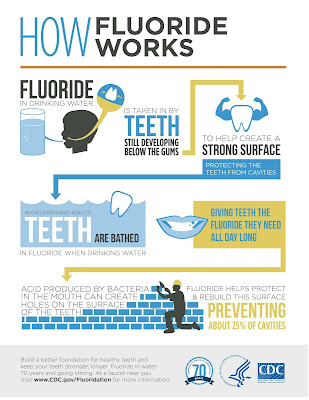Besides toothpaste; another source of Fluoride is our drinking water. And with this article I want to bring your attention to why this useful mineral is added to our drinking water.
Water fluoridation is the controlled addition of fluoride to a public water supply to reduce tooth decay. Fluoridated water contains fluoride at a level that is effective for preventing cavities; this can occur naturally or by adding fluoride. Fluoridated water operates on tooth surfaces: in the mouth, it creates low levels of fluoride in saliva, which reduces the rate at which tooth enamel demineralizes and increases the rate at which it remineralizes in the early stages of cavities. Typically a fluoridated compound is added to drinking water.
The recommended level of Fluoride in drinking water ranges from 0.5-1.5mg/L (milligrams per Litre). This is in accordance with guidelines from World Health Organization.
Bottled water typically has unknown Fluoride levels.
ADVANTAGES
- Water fluoridation reduces cavities in children,
- Water fluoridation aims to prevent a chronic disease whose burdens particularly fall on children and the poor,
- Water fluoridation slows the progression of tooth decay,
- Water fluoridation bridge can inequalities in dental health and dental care
CONCLUSION
Dental caries is one of the most prevalent chronic conditions worldwide.
The goal of water fluoridation is to prevent tooth decay by adjusting the concentration of fluoride in public water supplies.
https://www.faithful-to-nature.co.za/back-2-nature-toothpaste






